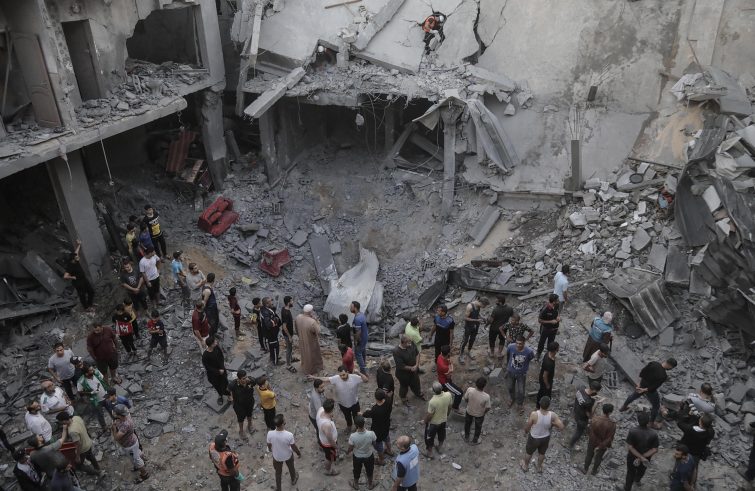
“The situation in Gaza is terrible: there is destruction everywhere, the roads are interrupted, there is no electricity, no water, no food… With the exception of a few areas, all telecommunications infrastructure, including the Internet, is out of order. The Israeli army is targeting everything, factories, shops, houses, people, even animals.” George Antone, administrative director of Caritas in Gaza, spoke to SIR from the Catholic parish of Holy Family, where he is sheltering with his family. He posted photos and video clips on social media to substantiate his story.
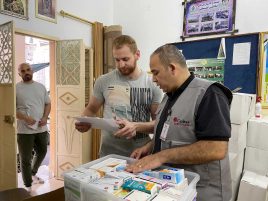 The Hamas attack on Israel on 7 October and the Israeli army’s harsh response have plunged the people of Gaza back into the never-ending nightmare of war. Since withdrawing from Gaza in 2005, Israel has fought four wars against Hamas terrorists, in 2008, 2012, 2014 and 2021. This is the fifth armed conflict, with an unprecedented number of dead and wounded on both sides. The situation on the ground has been further inflamed by Israel’s ultimatum to the population of Gaza to evacuate from the north and centre of the Strip to the south – in preparation for the ground offensive – and by the massacre at the Al-Ahli Anglican hospital, which left hundreds dead and wounded, with the blame being passed back and forth between Hamas and Israel. The Latin Catholic parish opened its doors to the displaced since the beginning, and today, two weeks after the outbreak of the war, it has become a sanctuary of solidarity and humanity that even Pope Francis looks at with concern and closeness. The Holy Father has made several direct telephone calls to the parish and to the parish priest, Father Gabriel Romanelli, who is currently stranded in Bethlehem because of the war, waiting to return to the Strip.
The Hamas attack on Israel on 7 October and the Israeli army’s harsh response have plunged the people of Gaza back into the never-ending nightmare of war. Since withdrawing from Gaza in 2005, Israel has fought four wars against Hamas terrorists, in 2008, 2012, 2014 and 2021. This is the fifth armed conflict, with an unprecedented number of dead and wounded on both sides. The situation on the ground has been further inflamed by Israel’s ultimatum to the population of Gaza to evacuate from the north and centre of the Strip to the south – in preparation for the ground offensive – and by the massacre at the Al-Ahli Anglican hospital, which left hundreds dead and wounded, with the blame being passed back and forth between Hamas and Israel. The Latin Catholic parish opened its doors to the displaced since the beginning, and today, two weeks after the outbreak of the war, it has become a sanctuary of solidarity and humanity that even Pope Francis looks at with concern and closeness. The Holy Father has made several direct telephone calls to the parish and to the parish priest, Father Gabriel Romanelli, who is currently stranded in Bethlehem because of the war, waiting to return to the Strip.
Antone, what is the situation in the parish and how are the faithful who have sought refuge there from the bombs and rockets?
In our Catholic parish of Holy Family, we are currently hosting over 500 displaced Christians, while another 350 are sheltering in the Greek Orthodox parish of St Porphyrios. Many have lost their homes, their jobs, their shops have been destroyed or partially damaged by the bombing. Everyone here is in a state of anxiety, fear and confusion: we don’t know what is going to happen next.
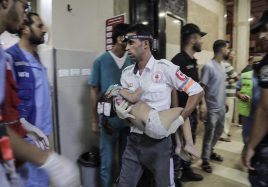 What was your reaction to the massacre at the Anglican Al Ahbi Christian hospital?
What was your reaction to the massacre at the Anglican Al Ahbi Christian hospital?
Everyone here in the parish was horrified by this despicable attack. It has always been our belief, and not just ours, that Christian places are safe because they have no political, military or ideological affiliations. They offer services to everyone without distinction, they serve the community as a whole. That is why the attack on Al Ahbi hospital came as such a shock to us. A place of humanitarian service, like a hospital, was desecrated. The Anglican hospital was doing nothing but treating and helping people, instead it was attacked. This is a criminal act.
How have you organised yourselves in the parish to deal with this humanitarian emergency?
As a Church we are trying to cope with this very serious emergency by trying to keep all the people in the parish together. There are families, old people, sick people, people with disabilities. We are providing them with water, food and some electricity as far as we can. We’re also trying to get mattresses and blankets, because we don’t have enough for everyone. We are trying to give them some peace and security in the current difficult situation.
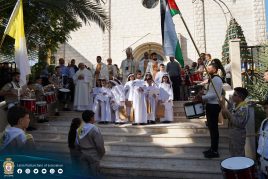 What concrete initiatives have you put in place?
What concrete initiatives have you put in place?
We have formed small groups, each with a specific task: thanks to Caritas Jerusalem, we set up a small outpatient clinic where we distribute medicines and offer medical examinations. We have another group that is in charge of the kitchen, and a third that deals with telecommunications to ensure better communication. Caritas vehicles are available to transport people, for example, to the hospital for a medical check-up. It is dangerous to leave the parish and drive around. We only do so in emergencies.
 There are also many children. What are you doing for them?
There are also many children. What are you doing for them?
There are indeed many children and young people here in the parish. They spend their days playing, praying and studying as much as they can. For our part, we do what we can to put a smile on their faces, to relieve them of the enormous burden of this tragedy.
The phone calls from Pope Francis, expressing his closeness and his prayers, have had a strong echo…
Pope Francis has called us many times to check on our condition and to express his solidarity and prayers. This is very reassuring for us because we don’t feel abandoned. We also receive extensive human, spiritual and material support from the Latin Patriarch, Card. Pierbattista Pizzaballa, and the entire Patriarchal Diocese.
In the past few days, the Israeli army instructed all residents of northern and central Gaza to evacuate to the south, a decision that supposedly precedes a ground offensive. You decided to remain, why?
Together with the parish priest, Father Gabriel Romanelli, and the Patriarch, Card. Pizzaballa, we decided to stay in the parish and not go to the south of the Strip, as Israel ordered, because this is our home, our homeland. Every day we pray and ask Jesus to protect us. We are sure that he will protect us from the evil that surrounds us. Gaza will never be without the Christian presence that is a sign of hope for all.
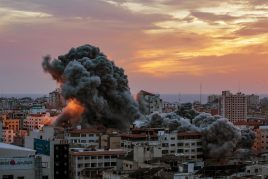 How do you see the future of Gaza?
How do you see the future of Gaza?
The future of Gaza? For now, let us concentrate on surviving. Then, when even this war is over, we will rebuild our homes, our city, our workplaces, as we have always tried to do over the years. This also means healing the many traumas that this conflict is causing the people of Gaza. We will rebuild our city, but now, I repeat, we must think about protecting our families, our children. That is the priority. We don’t know what will happen in the future.
In the midst of so much uncertainty and anguish, there is only one certainty left, which Antone posted on his social media, and that is the words of Thomas More: ‘Earth has no sorrow that Heaven cannot heal.’










